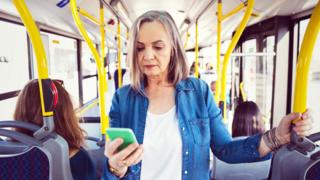 Image copyright
Getty Images
Image copyright
Getty Images
People who have been in close contact with someone found to have Covid-19 are now being traced.
The NHS contact tracers will ask people they get in touch with to self-isolate for a fortnight.
What happens if I test positive for coronavirus?
The hope is that contact tracing will avoid the need for national lockdowns, with more local restrictions used instead.
Anyone in England with coronavirus symptoms can now get a test. If it's positive you'll be contacted by text, email or phone and asked to log on to the NHS Test and Trace website.
There you will be asked for personal information including:
- Name, date of birth and postcode
- Who you live with
- Places you visited recently
- Names and contact details of people you have been in close contact with in the 48 hours before your symptoms started
Close contacts are:
- people you spend 15 minutes or more with at a distance of less than 2m
- people you have direct contact with - such as sexual partners, household members or people with whom you have had face-to-face conversations at a distance of less than 1m
The contact must have taken place between two days before and up to seven days after symptoms appeared.
No one contacted as a result of you testing positive for coronavirus will be told your identity.
A parent or guardian will need to give permission for a call with under-18s to continue.
What about other parts of the UK?
Northern Ireland was the first of the four UK administrations to bring in contact tracing, which is being carried out exclusively by telephone at the moment.
Scotland's system is called NHS Test and Protect, with 700 contract tracers at the moment - increasing to 2,000 later. It was launched as the easing of lockdown restrictions began.
In Wales, the ''test, trace, protect'' system launched on 1 June.
What if I am contacted by the tracers?
Anyone deemed at risk of infection will be told to stay at home for 14 days.
You will be asked to self-isolate, even if you do not have symptoms, to stop you from unknowingly spreading the virus.
This means that you should not leave your home for any reason. If you need food or medicine, you should order it online or by phone, or ask friends and family to drop it off on your doorstep.
The people you live with won't have to self-isolate, unless they also develop symptoms, but they must take extra care around you regarding social distancing and hand washing.
The tracers can track down the contacts of 10,000 people every day, the government says.
It's hoped the system - already used in places like Hong Kong, Singapore and Germany - will slow the spread of coronavirus.
How do I avoid scammers?
The NHS Test and Trace service will not ask you:
- for bank details, or payments
- for details of any other accounts, such as social media
- to set up a password or PIN number over the phone
- to call a premium rate number, such as those starting 09 or 087
England's Health Secretary Matt Hancock says the tracers will only be calling from 0300 0135 000.

Do I have to follow the instruction to self-isolate?
Health Secretary Matt Hancock said he was confident the "vast majority of people" would do their "civic duty" and follow the NHS test and trace instructions - which are currently voluntary.
Since then, the Department for Health has said that if people don't comply "we will not hesitate to introduce tougher measures, for example making visits to check they're home or issuing fines if they are found outside the house".
What about sick pay?
If people can't work from home, the government says employers must ensure any self-isolating employee is receiving sick pay and give them the option to use their paid leave days if they prefer.
Statutory Sick Pay (SSP) is £95.85 per week and paid by your employer for every day you are in isolation, as long as you meet the eligibility conditions.
There are fears that many workers will not be able to live on that amount and will be forced to keep working.
Shadow health secretary Jonathan Ashworth has urged the government to introduce "enhanced" sick pay.
"There will be people whose work conditions and employment conditions make [self-isolating] difficult for them so they need that security," he said.
When will the contact-tracing app be ready?
A smartphone app which would automatically alert people that they've been in contact with someone with coronavirus is still being trialled on the Isle of Wight.
It was originally due to be rolled out nationwide in mid-May, but the government now says it will be ready ''in the coming weeks''.
With Bluetooth switched on, the app would work in tandem with manual tracing - and could help get hold of people who might not personally know the person who has tested positive.
The Isle of Wight trial suggests that at the moment, because of lockdown, people have not been spending 15 minutes in the close company of many others - mainly only those with whom they live.
How have other countries used contact tracing?
Contact tracing has been credited with helping to lift restrictions in other places: